
Seven useful strategies to stop procrastinating on your job

Strategies to stop procrastinating on your job. The momentum of continues action fuels motivation. Procrastination kills motivation.
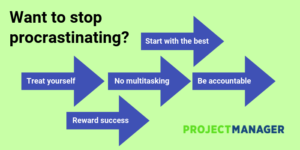
Most people procrastinate one or other thing at some point in their profession. But most of them don’t realise that they have been doing it until someone points it out, or when they finally get in trouble for it.
Procrastination has never been the direct cause of someone’s failure at work, but the resulting impact from it may be.
- The lack of any planning or poor planning may cause a project to be half done,
- Pulling an all-nighter to complete the job may be bad for health,
- Or it could lead to issues within the team members assigned to the job with you.
It’s a sort of delay, which creates or leads to all kinds of problems, and you end up losing the trust of people in you to finish the work. Why should you risk facing a lion on a prowl, when you can easily capture it and put it in a cage?
In this blog, we look at seven ways to stop procrastinating on the job.
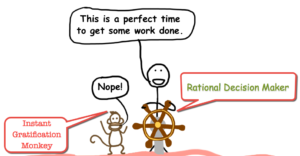
Seven ways to stop procrastinating on your job

- The self-regulating method
The human brain tends to lose interest if they work over long periods on a task without any reward. This need for instant pleasure gets manipulated in video games. For example, crossing a pit stop lets you level up, giving you an immediate bonus, which is a reward for staying on in the game. So, you never procrastinate in games.
You can implement that self-regulating method in your work as well. Use clocks to work for a specified period, and then reward yourself with a break to refresh your mind and start again.
- Realising the impacts of procrastinating
Another way to stop procrastinating is to dwell on the effect when you delay. Procrastination can result in job loss or large financial losses and even lead to you failing to acquire future opportunities. If you stick this in your mind, it may hold you back from delaying your tasks the next time you are about to procrastinate.
You can set milestones for your work and ensure you do things a bit at a time, rather than lumping up in one overwhelming shot all at once.
- Enjoy our achieve
It feels great to accomplish something, and there is no reason not to break that feeling down in smaller ‘bites’. Create a list of those things you should be doing and set deadlines for it. When you complete doing them, scratch them off the list. Now, doesn’t that feel good?
Through this, you will always remember your deadlines. Over time, you will learn how to be more productive, work faster, or how to get better results.
- Deal With It When It’s Small
Many people focus on bigger tasks and leave smaller ones to complete later, which leads to procrastination. These small tasks pile up eventually and don’t get completed on time. In essence, it’s these little things that could get done and settled fast, or right after the instructions are delivered.
But sometimes such tasks are overlooked, considering it as small matter until it grows too big to be completed on time. So, don’t leave it unattended if you can, no matter how unimportant you think it is.
- Do not work until you feel tired
Human psychology suggests that if you are tired, you will not have anything pending in your head. Then, your mind wanders off course from the task at hand. In short, you can get distracted very quickly when you are exhausted.
Follow the signs your body gives and start each new task again if possible. Taking a small break with non-taxing activities like reading a newspaper or listening to light music while relishing a cup of coffee can do wonders to revitalise your energy bar.
- Use the power of motivation
Employees often fail to remember the basis of their work, which could lead them to procrastination. Your business has a role, and your job has a purpose. Do you reinvent your personal objectives with the task at hand? If you can do it, then you are taking the right steps to strengthen yourself.
You find it challenging to get up in the morning to get to work, then something is amiss. When it is hard even to get started, procrastinating is the next stage. A lack of zeal at work may need some reflection on your part.
You may need to question your job role in the organisation if you need some form of motivation as in a new position, a new project or a new manager. Restructure your engagement and job responsibilities to avoid procrastination.
- Shun off temptations
Temptations are real obstacles, and they can take your attention away from work. Everyone has their own list of sinful temptations including TV, a game, a phone call, or a texting partner, Facebook, and so on. Identifying and keeping yourself away from these things will help you to overcome procrastination on the job.
You may opt to cut yourself off from the Internet when you are designing, writing or sketching. Alternatively, you can find a quiet place for yourself to get away from physical disturbances offline like noise, your children or from phone calls. It depends on your willpower to say no to ‘I’ll do it tomorrow’.


What are the proactive approaches to take charge of your career?
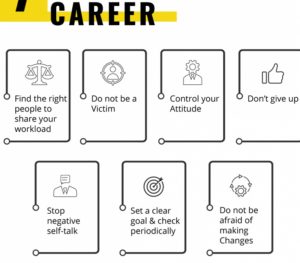
What are the proactive approaches to take charge of your career? Aggressive Career moves to take charge of your career.Dedicated strategies to take charge of your career for better growth.
Career development is the driving force and lifeline for many people around the world. They will continuously be looking to move up in their current firm or advance their career in another company.

Why career growth is important
Career advancement is one of the most critical elements that drive employee satisfaction within a company. Employees no longer work for a firm their entire career. They often find themselves hitting the ceiling in their current organisation.
Employees of today jump around to make the growth happen. In fact, non-linear career tracks are becoming the new norm. Fresh out of college, you may have had a clear idea in your mind about your first job role and work for a few years before promotion and the dream job.
Actually, you need to take charge of your own career, outline growth possibilities, and forget about leaving things to chance. Then only you will get to see things come together with the way you want them to. So, adopt a proactive approach and growth plan.

Proactive approaches to take charge of your career

- Become the lifelong learner
Are you really good at your job? Then, your employer may want to keep you right where you are. As a workaholic, you bring a lot of value to the firm. If you get promoted or taken out of your current position, it will leave a gap in the team. So you can see how this develops.
Just as your employer gets into a comfort zone regarding his team, you must always be looking to new horizons. Be a lifelong learner rather than becoming complacent. It is the nature of the human being to become bored or disengaged due to repetitive work. Sometimes you may find that your mind goes on autopilot. That is not a good scenario for career growth. It happens to most of us.
Think about your new interests, job functions, or any skills you can acquire. Or you can think about that next leadership opportunity you are looking for, and think about the ways you can find and develop your inner leader. Self-reflection and having an in-depth knowledge of your true motivation and passion will guide you. Growth will also earn from building on your current strengths. It will quickly shuttle you into promising areas.
- Create your own growth path and increase your exposure
If you take a scientist who is curious about business, working at the bench all day simply will not expose him to these new areas of interest. Growth will come only by being exposed to the new work.
When you ask a director of business development how they got to where they are today, many will tell you how they fell into any small position by accident. However, they took proactive actions to create their own growth via incremental steps or transitions from one business area to the next. So, figure out what you are naturally good at so you can capture growth opportunities.
- Dedicate your valuable time to new areas and projects
In a world that is continually doing business, an estimated 90% of the day is consumed by the ‘daily grind’ tactical activities of your job. It can bog down the time you dedicate to the ‘tomorrow’ activities, such as strategic planning. So, it is wise to spend at least one day in a week focusing on these other activities. If you only focus on the ‘now,’ it will only stifle your chances to grow.
Identify at least one leadership activity, strategic skillset, or new area of growth per month that you will like to dive into. Work with your employer or team members, and see where you can contribute value. If you have someone to take you under their wing and teach you the ropes, it will be great. It creates growth on the side, without losing the focus on your daily job responsibilities.
- Re-evaluate growth and get feedback
You will surely discover your career path as you go through various stages of growth. Things may get more evident as you continue to advance and take on new cross-functional roles, or expand into new areas.
Revisit, reflect, and get feedback often. If you still feel at a standstill or your manager is not ‘enabling’ or advocating for you, it may be the time to look for growth. Find new opportunities in different areas, or in a new company culture that promotes growth.
You will figure out that once you have put yourself into the lifelong learning mode and seek out new skills and challenges, you will uncover new opportunities on the horizon that will truly take your career to the next level.

How to deal with a manipulative colleague?

The manipulative colleague is everywhere in the workplace. Dealing with a manipulative colleague is quite easy with intelligence and proactiveness combined.

Have you stumbled upon a manipulative co-worker who gets on your nerves daily? You may face a lot of situations where you could not complete your job duties just because of this person. Well, let your worries fly away as we are here to save you from this situation.
Annoying people are common, and you can find them anywhere you go. So, it is impossible to eradicate them and spread peace in the air. The only thing you can do is to learn how to deal with these difficult co-workers. It is crucial when you become part of a job, which not only lets you thrive at work but also walk towards your goal.

How to deal with a manipulative colleague

The workspace can be a cut-throat environment, with everyone trying to get ahead in some way. You will get to encounter with plenty of those downright malicious co-workers on your way. They will do anything to get a leg up on the race and win the spotlight, especially before the boss. If you are just not that into scheming your way to the top, grab a few tips that help you steer clear of the manipulators in the workspace so that you can thrive at work and continue climbing up the corporate ladder.
- Identify
The first move is to know how to identify the connivers amongst your colleagues, which can be a tricky task. Be careful not to assume that someone’s request for assistance is manipulation immediately. Take a step back and assess the situation.
- Are you contributing your efforts to a co-worker who badly needs your help?
- Or are you about to perform someone else’s task while they reap the profits of the final product?
Manipulative people are mostly very good at disguising themselves as your friend when they need something but could care less about you otherwise. Pay attention to how consistently this person is asking for help from you. Check how apt they are to acknowledge about you or your contributions in their success in a group meeting.
Another sign to point out a schemer is whether they are prone to gossiping or bad-mouthing about others in the office. In general, note those people who always have negative comments to say about other employees. They are probably not the person you want to surround yourself with, nor lend your assistance to.
- Just Say No
Once you are able to differentiate manipulation from simply asking for help, don’t be scared to say “no” to these cancers of the office. They are only out to advance their own careers, and not anyone else’s. If a manipulative employee asks any help from you, the best thing to do is explain that you are busy trying to meet the such-and-such deadline. You may lend some advice or suggestions to help that person complete the task. This way, you are not rude or abrasive when declining to help, and yet offering free advice in the end.
- It is Them, Not You.
Don’t take things personally. Understand that it’s them, not you. These “wolves in sheep’s attire” are taking out some personal issue or on you and it’s usually unwarranted. So, it’s important to maintain professionalism when dealing with such characters in the workplace. Sometimes biting your tongue is essential when you want to lash out. The best way to deal with the continuous wickedness of a manipulator is to address the issue with the person privately. If he continues his behaviour, then the next step is to consult your manager. Your last option is to escalate the matter to Human Resources and register your complaint.
The absolute worst thing you can do when you are being manipulated or taken advantage of in the workplace is to ignore the behaviour as it will only get worse. So, take action as soon as you are aware of the cunning behaviour before it ends up costing someone’s job – and that someone will probably be you.
So, be ready for the next time your corrupt co-worker starts his spiel about how much he needs your assistance. By getting our tips into action, divert his requests and let him down easy effectively.


Tips for tackling yourself when you are frustrated at work

Tips for tackling yourself when you are frustrated at work. Frustrated at work decrease the productivity of an employee. The frustration of an employee is due to various internal and external reasons.

Work-life can get pretty frustrating, especially when working with difficult coworkers, poor management or an overload of tasks. You can feel your blood pressure rising inside, and you are struggling hard to hold the temptation to yell at someone or punch something. But you must find ways to tackle any negative emotions that can affect your job.
- Do you want to lose your job for shouting at a lazy colleague?
- Or do you wish to receive a warning after ranting at your boss?
There are many ways you can follow to stay calm at the workplace and manage your frustrations. You may feel like to go on an office rampage or quit your job. Then, take a breather and consider these great tips to reduce your frustration at work.
Top tips to help you manage frustrated at work.

- Breathe deeply and count 1 to 10
The motive of this exercise is simply to resist the trigger. It is better to make a real effort to distance yourself from the edge rather than flying off the handle and giving a piece of your mind to everyone around you.
Count 1 to 10 and focus on your breathing. It is one of the tried and tested mindfulness methods. It helps slow the heartbeat, enabling you to reflect on the situation and choose your response calmly.
- Talk to someone you can trust
Discuss the issue with someone whose opinion you value, who understand your office dynamics and who you can confide in. If you can, grab a quick break and pour your heart out to him or her. Better you stay outside the office space so that no one overhears your conversation.
This simple act of telling someone else about what happened with you may put things into perspective for you. Your confidante may offer sympathy and even suggest the right solutions that hadn’t occurred to you.
- Write it down but don’t send it
If you can’t resist the intense urge to empty your negative feelings from your system, write it down. You can scribble your honest opinion onto a piece of paper or hammer out a candid email. Once your demons have been exorcised in this way, you will feel much better. However, never let yourself send the mail to anyone under any circumstances. File it away to a later date and reread it when you are calmer, then delete the mail for good.
- Leave the building
Sometimes, you just need to keep some physical distance from the situation for a few moments to cool off. You can go outside the office environment, and get some fresh air. Take a brisk walk, have lunch from your favourite restaurant or just sit somewhere quietly for a while. Doing this, you can compose yourself and gain mental clarity. By the time you return to your desk, things won’t seem half as intense.
- Get some headspace
To create some space in your head, you need to distance yourself from the stressful situation.
- Check of your Twitter feed?
- Pursuing your favourite website?
- Play any of your favourite games?
- Carry out any activity that can make you happy.
It will leave you relaxed and more focused to deal with the office situation productively and acceptably.
- Get some emotional support
Personal support networks are a boon to you when you are feeling hard to move ahead. You can connect with them and ease your mind.
- Text your spouse for a virtual hug,
- Or call a close relative or meet up for coffee with your best friend to cheer you up.
It can make you feel valued and appreciated by your family and friends at the times when things go wrong in the office.
- Recognise your personal triggers
Everyone around the world has ‘hot buttons’ that can trigger angry or violent responses without warning. The trick is to be conscious of your personal triggers and to recognise them in time before they overwhelm you. If you learn to take a deep breath and step back from the brink every time your buttons have been pressed, you will have made huge progress in controlling your anger.
- Reward yourself
Managing your anger is a real personal accomplishment, and you should be proud every time you have succeeded in averting an angry outburst. Give yourself some self-love to acknowledge the fact that you are slowly learning to get a handle on your negative feelings. Time for a treat!
Work-life can really take a toll on your mental wellbeing. But as stated in this blog, there are several effective ways to battle feelings of stress and frustration. It’s merely a matter of composing yourself and stepping away from the situation as difficult as it may be.
By practising these tips, you can handle not only your emotions but also those people work for you as well as those working with you.


How to effectively onboard your new hire in six steps?

Onboard your new hire in six simple steps.Onboard your new hire for better retention of the new hire as well as a better relationship with the colleagues in the workplace.

Hiring new team members is one of the biggest challenges for every organisation. Once you hunt down the right person, you need to provide him with adequate training and ensure you set them up for success. An excellent onboarding process for new employees is the key to that success.
Are you in search of the ideal way to welcome new employees to the workplace? Then, follow these six steps to effectively onboard new employees to your organisation.

Six steps to effectively onboard your new hire to your organisation.

- Prepare the office for the new arrival.
The first day on the job should get organized and scheduled before the new person walks through the door. Never let them discover that none of their new co-workers was even aware that they were coming. Or they see their supervisor scrambling to find them a workspace or the tools they need to do their job, like a phone or computer. It can be disheartening to the new hire and make them wonder why they got recruited in the first place.
You can avoid this dilemma by taking the time to prepare their workstation before their arrival and letting their new colleague know which day their new team member will be starting.
Employers should build out a schedule in advance that covers learning the job in particular and company policy and process in general. Share this plan with your new employee in advance. Also, send a copy to all employees in the company who is involved with the onboarding process.
- Provide a grand tour inside the office
A new office can confuse the new person, especially when they don’t know anyone and have no idea where anything is. Imagine needing to use the restroom on his first day and not knowing where to go. So, start your new employee off with a tour of the office and the facilities, introducing them to co-workers as you go along. There’s little chance that they will remember everything, but it will help them feel more relaxed approaching people with queries later on if they know they have already got introduced.
- Assign a mentor.
One of the best facilitation tactics for onboarding is a mentor relationship. Mentors provide proper guidance that goes beyond traditional training. Match up an experienced employee with the newbie in the early stages of training. A mentoring relationship will prove valuable to the new employee’s integration into the workplace.
- Make positive introductions a priority.
“This is Susan, and she will be taking your job one day” It is obviously a horrible way to integrate a new employee into the workplace. Create goodwill toward the new hire by introducing them to the current team with a short explanation of the person’s qualifications and expertise. This type of introduction helps the current employees become familiar with and accepting of the new member. Also, Avoid statements that can create competitive or insecure feelings.
- Request feedback from a new hire.
Consistent feedback from the new employee is valuable in knowing which aspects of the onboarding process work and which ones need to get twitched. Regularly ask for input on the training process, and measure its effectiveness.
- Provide a cohesive goal.
From the beginning, every new or seasoned employee should understand the big picture company goals, along with his or her specific tasks. A common goal helps to create greater collaboration and harmony.
Facilitation strategies for integrating new team members require planning and follow-through. The results bring a more dedicated, engaged employee and fewer workplace disputes, which is absolutely worth the effort!
Employees are an organisation’s most valuable asset. Once you find out great employees, you need to take steps to keep them. Remember that welcoming a new employee begins as soon as the job offer is accepted. It’s a process that can redefine your business culture if you do it the right way.



How to help your employees to improve productivity?

How to help your employees to improve productivity.The best ways to motivate employees to increase productivity in the workplace.

Every employer wants his or her employees to use their talents to the fullest capacity. But in reality, this can’t be done most of the time. Everyone has ups and downs in their work-life, and every employee is bound to go through a slight dip in productivity from time to time.
As a boss, it’s your responsibility to help your team to overcome those slumps and bring performance and engagement levels back to their peaks. There are several ways to express that you want more excellent results from your team, but barking orders and increasing demands that everyone puts in more effort won’t take you very far. An open, honest two-way conversation will aid you more to get to the root of any performance issues, even if it’s minor or temporary.
The more motivated your team members are, the more smoothly your business will operate, so it’s smart to look into ways that you can motivate your employees. Look for ways that you can motivate each employee to do her best. Here are four ways to get started.
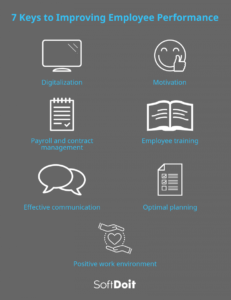
Four ways to motivate employees to improve productivity

Empower your employees.
Empowerment is the major key to making people efficient and to motivate employees to improve productivity. It makes teams happy, and if they are happy, they are more productive and produce higher-quality work. Let your team have their own strategy and goals, and leave it up to them. They don’t need to come to you for asking a million queries. This approach empowers your teams to think long-term rather than thinking about the day-to-day.
Make sure that your employees have access to the resources they need to succeed. Empower them to create and plan for how they can best be successful. It brings out their vision and then holds them accountable for this vision by establishing deadlines and clear deliverables. Better results come when your team feels valued and equipped with the proper resources needed to perform the job successfully.
Ask the right questions and listen.
- Ask plain, open-ended questions and get to the root of the problem:
- Tell me in your own words about your knowledge of the objectives you have to meet.
- What do you feel is pulling you back from meeting your objectives?
- Why do you think that?
- How would you overcome this roadblock?’
Most crucial thing than asking the right questions is keeping quiet and become a good listener to listen to your employees’ concern. One of the greatest sources of frustration in the workplace is feeling like you are not being heard.
You should diagnose the source of an employee’s struggle. Some instances are that they do not have enough clarity about expectations, standards, priorities, methods; they lack confidence or skills; they are not team players, or they lack motivation. Once you know the source of their struggle, you can take the appropriate leadership action which may be direction, coaching or career counselling.
Implement the right technologies.
In today’s world, where workforces often get decentralized, creating powerful communication channels is incredibly crucial to the success of employees. Using collaborative platforms, every employer can interact with his team. They can use these platforms to validate comprehension, allowing a fully closed-loop communications solution to drive engagement and performance.
Communicate (nonverbally) through your investment in the well-being of your employee.
You can successfully improve employees to improve productivity by providing fantastic employee perks. It’s not all about money. Apart from paying well and frequently promoting from within, you should also support staff flourishing through opportunities, training and exciting travel.
When you invest in a person, it creates an ambience where people want to work hard. Care about what’s going on in their personal lives. Explain to them it’s not about the bottom line or simply getting the job done but about what you are doing together. If you truly care for someone and their well-being, they’ll allow themselves to be pushed harder because it’s not coming from a place of greed.
Many managers make the mistake of thinking that money or prizes are the only way to make employees work harder. It isn’t the case always. Intrinsic motivation in your employees can be a very powerful way to bring the company together.


How to review employee performance effectively?

Employee performance Appraisal that is conducted adequately leads to greater employee confidence, higher potency, creating a positive society. An Employee Performance Appraisal will improve overall performance and effectiveness of an organisation.
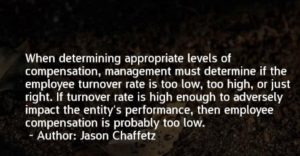
“A performance Appraisal that is conducted effectively leads to greater employee morale, higher productivity, creating a positive culture and improved overall performance and effectiveness of an organisation.”
— Kumar Parakala
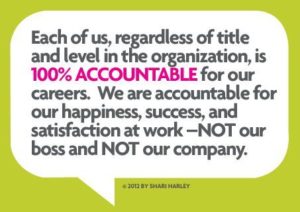
Have you get tasked with evaluating employee performance? We know you have. And that is the reason you are here. Well, you may wonder why these evaluation processes are essential. Fret not. It is common if you are an employee of a high-ranking company.
Most companies conduct employee performance evaluations frequently. It is to ensure that company morale is high and that their employees are successfully completing their jobs. It also ensures that their employees have the space to grow and improve to benefit themselves and the company. When employee performance assessments haven’t performed, it can result in damages to the company due to poor employee background check.
We hope you understood the importance of employee performance evaluations by now. What happens if you are unsure of how to perform them? It can be quite a nerve-wracking assignment, especially if you have yet to perform such a task. Fret not. If you prepare correctly, conducting employee performance assessments can be a breeze. Grab these seven tips on how to do it effectively.

“When feedback is included as part of regular, ongoing performance discussions throughout the year, the employee, the manager and the organisation are all better off.”
— Shawna McKnight
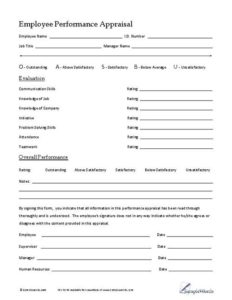
Seven tips on how to do employee performance evaluations effectively

- Give useful feedback throughout the year
Are you providing feedback to your employees only during an annual or semi-annual performance evaluation? Then, you are on the wrong boat. It could not get you anything other than wasting the precious time that your employees could use to grow.
Conduct employee performance evaluations throughout the year. By providing useful feedback throughout the year, you can ensure that your employees, your firm and the office morale is doing well.
- Be transparent about your performance expectations
Be transparent about your performance expectations and evaluation guidelines throughout the year. And before the performance evaluation, ensure that you are straightforward about what it is you expect from your staffs. They should always know about what level they are expected to perform, but before the evaluation, it should also be apparent exactly what the assessment guidelines are to be.
Your staffs should know how they were performing before you meet with them. And the meeting should serve as a secure space for an open conversation about what they are doing fabulous and where they need improvement. If you hold these expectations and guidelines to yourself, you are not only hurting your staffs but your company also.
- Address poor performance immediately with respect
Are any of your employees having poor performance throughout the year? Then, don’t wait until evaluation time to notify them that they need to improve. Instead, take them aside during the year and have a conversation. Know about what they are struggling with. It can create a healthy relationship between the two of you. Your employee will feel comfortable being open with you about their performance.
However, make sure to address poor performance respectfully. Always remember that you want to help your employee’s progress. So, do not rebuke them.
- Don’t only give negative feedback
We all have an employee who needs to improve their performance. But never focus on the negative aspects of their performance alone. It will make them feel unappreciated, hurt and will get low morale. It could affect even more of the company. When addressing negative feedback, be sure also to mention what the employee does well.
“People cannot improve if they are not receiving feedback and allowed to make corrections.”
— Michael D. Haberman
5.Set goals with your employees
Employee performance assessment meetings should be used to set new goals. Have an open conversation with employees about their performance. You can discuss both the positive and negative aspects and then decide how to move ahead. The discussion is only beneficial if something productive comes from it.
Employees should leave the meeting with a set of goals that they want to achieve for the benefit of the company. Setting goals can motivate employees to do better rather than leave them feeling embarrassed for poor performance.
- Offer solutions as well as assistance
When you conduct employee performance evaluation, you may notice any of your employees are struggling. Then, offer a solution or needed aid for him to improve. Remember that you aren’t just an evaluator, you’re a leader too. If you expect employees to progress, but don’t help them do so, they will feel confused and lost.
- Focus solely on employee performance
A final point to remember is to ensure that the assessment is just about their performance. As a human being, we all have people that we don’t like. Don’t make performance evaluations personally. Remember that you are assessing their work performance, not their personality or attitude. Keep it professional.
We hope these seven tips make you feel more confident about the employee performance evaluation process. If you use these golden tips, evaluations will be a breeze!!
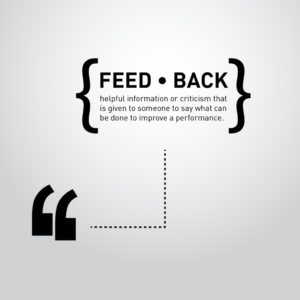
“To be effective and yield results for your business, performance management must be a year-round process with no end.”
— Teala Wilson

How to move up the rungs of the corporate ladder?

Climbing the Corporate ladder in the workplace needs hard work and intelligence to be able to scale better career growth. The corporate ladder can be a big fall if skill and ability are put in order.

Ever wondered how everyone around you keeps getting promoted, but you kept left behind? Well, you don’t have to wonder any more. The good news is, the whole process is not as mysterious as it looks from the outside. It just takes some time and commitment. Before mounting the rungs of the corporate ladder, you should learn how to get a promotion.
The first and foremost thing is, promotions are not a given. Very often, we expect that if we work for a company for a certain amount of time, we will get promoted. Or, we believe our intelligence or speed will always equal a promotion. Assuming you should get promoted is a quick way to hold yourself back.
It’s important to realise that you must create and manage your own career path — through one or multiple organisations. And remember that a promotion isn’t always an upward path. Sometimes, you need to make a lateral move to position yourself for a next upward move.
How do you develop your promotion plan? We have compiled eight strategies that are the keys to how to get a promotion.

Eight key strategies on how to climb the corporate ladder

- Develop Mentoring Relationships
Have a mentoring relationship with the c-level employees in the company. It helps spread the good word about you.
Some firms have formal mentoring programs. But even if your firm does not, there are still many ways you can build relationships with people in higher positions. Mentors are also excellent sources for information and career guidance.
- Quantify Results
Promotions aren’t necessarily based on your past performance. But you can certainly make a much better case for a promotion by showing detailed information about your past successes. Those who get results get ahead.
Make a record of everything you do that puts the firm or your department in a good light. Remind your employer of the things you do that are creative and innovative. Point out acts that highlight your dedication and loyalty to the organisation.
- Establish a Bonding with Your Boss
Your boss can be one of the best advocates for your promotion. He can either promote you to the next position or can hold you from any movement within the firm. Use all possibilities to make your boss a key supporter of your promotion. Seek counsel from him and stress your interest in staying with the firm.
Rather than using performance appraisals just to go over your achievements, talk with your boss. Discuss potential roadblocks to the promotion and how to overcome those roadblocks.
- Acquire New Knowledge and Skills
The best ways to win promotion is to expand your skills and knowledge sets in areas that are critical to the company. As technology and other environmental forces change fast, you need an ever-increasing skill set to perform your job and stay marketable.
- Build Your Network
Let more people who know you, your strengths, abilities, your ambitions, and your value to the organization. Then, the more likely your name will get discussed when opportunities arise.
A bonus of networking is that you will learn a lot more about the company if you connect with people in other areas of the firm. Plus, if the promotion you are seeking to get denied, networking will help you find a new job at another firm down the road. It’s a win-win.
- Ask for More Responsibilities
Volunteer to help different departments or teams or simply ask for more responsibilities. It increases your value within the company. Asking for more work points your interest and desire to help your department and firm to succeed. It also benefits put a spotlight on your value to the organization.
- Be a Team Player
Nowadays, most of the works get accomplished through teams. It becomes even more critical to share successes with your teammates and to avoid pointing out your finger when there are failures. By being a team player, you can not only build your reputation but increase your value to the organization.
- Create Your Own Opportunities
Study the needs and challenges of the organization. If you see any area that has been neglected, and you have the critical skills required in that area, you can write a proposal for a new post. No matter whether the company go for the new position or not, you have again proved your initiative, creativity, and worth to the firm. These things can help you the next time you request a promotion.
Finally, don’t threaten to leave your firm if your boss doesn’t promote you. It is a huge mistake young employees often make. They are so invaluable that they start making silly demands. Before long, they find themselves not only without promotion but possibly, without a job at all.


How to overcome procrastination affecting your career?

Procrastination affecting your career will cause a severe effect on the long term in the workplace.

Is procrastination holding you from achieving the goals you want or need to accomplish?
Many people have a very long to-do list. Some tasks or projects, even quite important ones, remain unfinished for a long time, and it’s easy to start a guilty or ashamed feeling about what you have not yet completed. The most probable reason for procrastination maybe stems from a perception that their project will be difficult, expensive, or confusing.
What is your reason for procrastination affecting your career? How will you overcome it? This blog can help you identify why you delay and how you can overcome your procrastination habit once and for all.
How then, can we move ahead when stalled on a new project? Here are a few useful tactics that can help you.
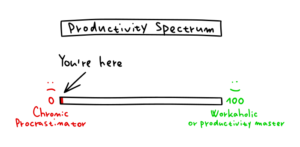
How to overcome procrastination affecting your career?

- Know what you should know and what you don’t.
There are a lot of projects where it is essential to understand exactly how something has set up. There are others where you need to know only enough to keep things going. For example, take setting up an email newsletter. If setting up Mail Chimp or Constant Contact is not intuitive for you, and you are wasting hours doing things you don’t love. Let another person do the initial set up. You can still manage it monthly from there, even if you were not the one to build it in the first place.
- Ask the question:
What other information do I need? Sometimes we need to research to get started with a project, and sometimes, we already have all the data. If you need more information, decide what exactly that is and make a solid plan to get it. Once you have everything, look at it all together so you can see the big picture of the project to feel more confident.
- Never go for too many opinions and suggestions.
Sometimes, you may long for the support of friends and family. But, before asking their opinions, ask yourself how much they really know about the decision you are trying to make. For example, when it comes to logo design, I trust my designer, not my friend who’s good with colours (even though she may have a very strong opinion). When it comes to selecting software to run my business, I listen to people who have chosen this option before me. Asking for too many inputs is often just another road towards procrastinating.
- Break your project down into categories.
Something like redesigning your website can make you feel like a huge task. But, if you break it down, you will see more manageable chunks of work. Then, start with the homepage and make a list of what you want to include. You can add things like
- Facebook and LinkedIn social media icons,
- A headshot of yourself,
- Testimonials from your clients,
- A link to your calendar.
The point is, be as precise as you can.
- Don’t keep the details in your head; write them down.
When we don’t have a well-written plan, we will spend hours spinning our wheels trying to remember what we did and what to do next. So, spend the time upfront to write a detailed plan to see the entire project. It will save time and work.
- Leave perfectionism behind.
It’s better to get started and improve your work rather than waiting until you have every detail, just right. You will learn as you go and make it better over time. Businesses evolve all the time. So, develop the improvement muscle, and you will be able to stay current with what your business needs.
Overall, the most difficult part of any new project is getting started. Once you start moving, everything will fall in the right place.
Apply these six simple moves and put procrastination affecting your career away forever!


How to improve yourself to become a true leader at work?
How to improve yourself to become a true leader at work. A true leader is the one who knows the way goes the way and leads the way. A leader is one who is in the forefront leading his team.


How to improve yourself to become a true leader at work? The best ways to be a true leader in the workplace.A true leader is not a boss, but one who leads and be followed.
Most people around the world have conditioned to think that leadership at work can only get attained through a position of power. Are you one among them? Then, the truth is, real leadership can come from anywhere. It’s not your job title or position that allows for great leadership. It’s the dedication to creating positive change in yourself and others around you.
It doesn’t matter you come from what walk of life or where you sit in the company. You can always develop and enhance leadership skills.

A true leader in the workplace

A real leader has a deep understanding of the firm’s mission and embodies the core values set forth. It may not seem that important. But, you may get surprised how rare it is to find an employee who can verbalise the objects and beliefs of the organisation they work for.
Most employees often look out for themselves and potentially their immediate co-workers. They surely don’t have the greater interests of the firm’s values at heart. But when a staff keeps the cultural mainstays of the organisation at the forefront, they are in a better position to influence others. It is where leadership begins – not in an executive office, but out in the bullpen or the field.
Core values are a critical factor of a company’s ability to grow and prosper. Without them, you have nothing to tie your employees together and no greater goal you are united to work toward. Without core values, your potential leaders will be rudderless, focusing on daily operations instead of elevating their employees and themselves.
How to be a leader at work
Leadership starts on an individual level. Look at yourself before asking for a promotion or looking at management opportunities. Do you display the skills and traits needed in a good leader? If not, are you ready to put the time and effort into developing them?
- Emotional fitness
Extraordinary leaders bring certainty into uncertain circumstances. That does not mean that you have all the solutions, but you do have the inner conviction that you can find the solution and move forward. The key to emotional fitness is getting ready for anything. When you bring creativity, humour and curiosity to stressful situations, others will naturally turn to you when things become complicated or chaotic.
- Ready to grow
True leaders understand their own strengths and limitations and use this insight to challenge themselves to grow consistently. You consider criticism and setbacks not as catastrophic roadblocks, but as a way to improve yourself and the situation. You are continually honing your skills and developing new ones. When you are continually striving to better yourself, you will be able to give and become more than you ever thought possible. You will defy the odds, set a new standard and step up to create the future you want.
- Supportiveness
A real leader is a great facilitator. Those in executive chairs can often intimidate other employees with their title and power.
- Do you encourage others to speak up?
- Do you publicly recognise them when they do an excellent job?
You look for greatness in your colleagues. Be pleased to listen to what they say rather than offering your opinion over and over. If you oppose them, you discuss it constructively. A real leader understands that when people are rewarded for progress and honoured consistently, their drive to become better increases as well.
- Resourcefulness
Leadership in the workplace requires resourcefulness. It doesn’t mean doing more with less. It’s partly about delegation and realising that your co-workers have more potential than you may think before.
- How to become a leader at work
Becoming a leader brings a lot of challenges, along with rich rewards. Not everyone is suitable for leadership, but those who always find a way to move ahead. In case, if you aren’t sure where to begin, there is plenty of things you can do to advance your career toward leadership.
- Take the lead role on a project, an account or a team
- Enrol in leadership training through your firm or a class
- Let your higher-ups know you would like to move in that direction
Why should you become a leader at work?
Leadership is a heavy blanket to wear, but it can benefit you in remarkable ways. Whether you are a leader in an official capacity or not, your confidence is bound to surge when a group of people look up to you. Instead of grinding along with waiting for each day to end, you should extract more excellent results from the same hours or minutes. Cut through the chaos of to-dos and focus on how to get true results.
If you are desperately thinking about how to be a great leader at work, things like limited resources are no longer a barrier. Forget about those roadblocks and setbacks you used to see for everything. Then, you start seeing opportunities for innovation and self-realization for yourself and those who follow you.

End of content
No more pages to load





